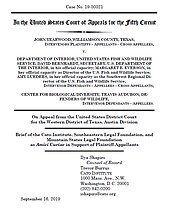Learn more about Cato’s Amicus Briefs Program.
Much like lawyers, spiders don’t drum up warm feelings for most people. It’s probably because both are known for spinning webs. Unlike lawyers, however, the federal government has placed some spiders on the endangered species list—and not just big ones, but ones so small that it takes 14 surveys of a cave to even make sure they’re there. One such spider, the near-invisible bone cave harvestman, is found only in a small section of Texas and resides in an unknown number of underground caves.
It’s easy to imagine a property owner’s shock when he finds out his land is teeming with these small spiders and that he could face hefty fines if he accidentally steps on one. This sort of mistaken squashing, defined as a “take,” is prohibited by the Endangered Species Act (ESA). As an act of Congress, the application of the ESA to the bone cave harvestman must be constitutionally authorized. But even though the bone cave harvestman is utterly devoid of commercial value—it’s not a delicacy, no one is making necklaces out of them, and no one is traveling from other states to see them—the government claims the Commerce Clause allows it to list the spider as endangered and impose harsh penalties for a “take.”
Article 1, Section 8 of the Constitution grants Congress the limited power to regulate commerce between states. Taken at face value, the Commerce Clause would allow the federal government to control the movement and sale of goods that affect the national market—for example, gasoline and other commodities. It wasn’t written to justify federal regulation of noncommercial activities, goods, or species. Yet, the government does precisely that when it uses the ESA to punish property owners for interfering with a nearly undetectable spider that has no commercial value at all.
Cato, joined by the Southeastern Legal Foundation and the Mountain States Legal Foundation, has filed a brief in the Fifth Circuit Court of Appeals in Yearwood v. Department of the Interior. We argue that listing the bone cave harvestman under the ESA goes too far in the otherwise admirable goal of preserving wildlife. In NFIB v. Sebelius, the challenge to Obamacare’s individual mandate, the Court ruled that someone who hasn’t purchased health insurance could not be forced to do so under the Commerce Clause (but, alas, they can be made to pay a “tax”). Despite ultimately losing that case, the decision is still an important precedent for the limits of the Commerce Clause. The bone cave harvestman is like someone who hasn’t purchased health insurance. The creatures are not in the stream of commerce and their mere existence can’t be said to put them in congressional jurisdiction. Exempting the tiny spider would not require striking down the entire ESA. Surely, the safety of red wolves, blue whales, and spotted owls does not depend wholly on a tiny spider’s appearance on the Endangered Species List. The Commerce Clause has grown far too many legs, and the Fifth Circuit should prevent it from endangering our constitutional order.

This work is licensed under a Creative Commons Attribution-NonCommercial-ShareAlike 4.0 International License.


